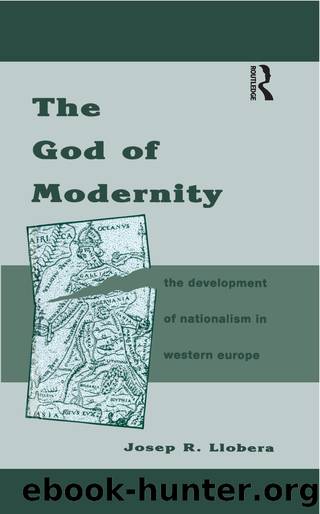The God of Modernity by Josep R. Llobera

Author:Josep R. Llobera [Llobera, Josep R.]
Language: eng
Format: epub
Tags: History
ISBN: 9781000189513
Google: 5UQHEAAAQBAJ
Barnesnoble:
Goodreads: 93916
Publisher: Routledge
Published: 1994-11-10T00:00:00+00:00
In an earlier contribution, Strayer (1963) had examined more specifically the connection between state formation and nation-building. His main proposition was that where a medium-sized regnum (that is, originally a barbarian kingdom) was turned into a single state, national identity developed without major frictions and without the need to use highly pitched emotional calls; linguistic and cultural variations progressively disappeared or were disarmed of their centrifugal potential. No doubt unitary states like England had an advantage over mosaic states like France and managed to develop national unity at an earlier stage. However, when different states were created as a result of breaking up a regnum, the development of nationhood was very problematic, argues Strayer, because 'there was no correspondence between the political framework and the ancient traditions of the people. The historical, cultural, and linguistic group to which people felt they belonged was always larger than the state to which they were supposed to give their allegiance' (1963: 24). The existence of the state bureaucracies was also an impediment to the creation of a nation-state out of a multiplicity of small states in the nineteenth century. Germany and Italy are well known cases in point. Even more complicated was the condition of the Habsburg and Ottoman empires, which were 'mosaic states largely made up of splinters of several regna' (1963: 25). How could a sense of nationhood develop there? Things are, however, more complicated than they appear in Strayer's model. In my view he gives too much importance to the regna as deus ex machina of the European nations. Furthermore, he contradicts himself by, on the one hand, asserting the original ethnic diversity of the regna only later to assume that a splintered regnum breaks up a unity. In general, he is also prisoner of the idea that the nation-state must of necessity have a medium-sized territorial dimension. He rightly emphasizes, though, the role of the medieval state in shaping nationhood.
At a more abstract level, Norbert Elias (1982) has discovered some key mechanisms of the period under consideration (late medieval and early modern). The first he refers to as the monopoly mechanism, and it is the tendency to formation of territorial and political monopolies from a starting point in which a plethora of territorial principalities compete within a given area. Elias' point is that in the long run the stronger states tend to absorb the weaker ones. The ideal model for this type of development is France (Gallia in our terminology), but the mechanism obviously has wider geographical application. The second mechanism is the institutionalization of power. With the increased penetration of royal power into the different layers of society and with sustained economic development the tendency of the state is to specialize its functions and to develop impersonal bureaucracies. This is also a mechanism which applies generally, but in the early period it is typical of England. Finally, there is the royal mechanism. It refers to the ability of the state to centralize functions and maximize power by playing the different Stände and provinces against each other within a given country.
Download
This site does not store any files on its server. We only index and link to content provided by other sites. Please contact the content providers to delete copyright contents if any and email us, we'll remove relevant links or contents immediately.
| Anarchism | Communism & Socialism |
| Conservatism & Liberalism | Democracy |
| Fascism | Libertarianism |
| Nationalism | Radicalism |
| Utopian |
The Secret History by Donna Tartt(16624)
The Social Justice Warrior Handbook by Lisa De Pasquale(11489)
Thirteen Reasons Why by Jay Asher(7788)
This Is How You Lose Her by Junot Diaz(5773)
Weapons of Math Destruction by Cathy O'Neil(5037)
Zero to One by Peter Thiel(4824)
The Myth of the Strong Leader by Archie Brown(4789)
Promise Me, Dad by Joe Biden(4447)
Beartown by Fredrik Backman(4419)
Stone's Rules by Roger Stone(4416)
How Democracies Die by Steven Levitsky & Daniel Ziblatt(4399)
The Fire Next Time by James Baldwin(4343)
100 Deadly Skills by Clint Emerson(4079)
A Higher Loyalty: Truth, Lies, and Leadership by James Comey(4033)
Rise and Kill First by Ronen Bergman(4012)
The David Icke Guide to the Global Conspiracy (and how to end it) by David Icke(3883)
The Farm by Tom Rob Smith(3872)
Secrecy World by Jake Bernstein(3783)
The Doomsday Machine by Daniel Ellsberg(3731)
